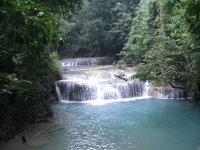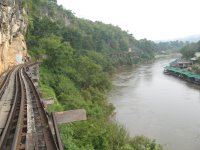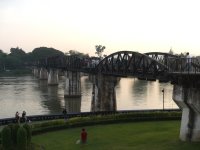After a final visit to the breakfast buffet on Friday morning we left Bangkok to catch the bus to Kanchanaburi, 130km to the west of the capital. This area of Thailand is a popular tourist destination, primarily due to the fact that it`s home to the infamous Bridge on the River Kwai and the `Death Railway` constructed by Allied PoWs during the Second World War. That afternoon we paid a visit to the Thailand-Burma Railway Centre, an interesting and thoughtfully-presented museum, which explained the history of the railway.
 Having lived in Japan for the past ten months it was a strange experience to read about all the atrocities committed by the Japanese during the war; however, from a historical perspective I have to admit it was morbidly fascinating, as well as, ineveitably, deeply shocking. Feeling a little subdued we returned to our guesthouse, which helped to lighten the mood a bit. The place we stayed was fantastic, set in beautiful tropical gardens. Our room even boasted an open-air shower, which seemed like a wonderful idea until you noticed how many different species of bug you were sharing it with and started discovering bites in places other mosquitoes couldn`t reach.
Having lived in Japan for the past ten months it was a strange experience to read about all the atrocities committed by the Japanese during the war; however, from a historical perspective I have to admit it was morbidly fascinating, as well as, ineveitably, deeply shocking. Feeling a little subdued we returned to our guesthouse, which helped to lighten the mood a bit. The place we stayed was fantastic, set in beautiful tropical gardens. Our room even boasted an open-air shower, which seemed like a wonderful idea until you noticed how many different species of bug you were sharing it with and started discovering bites in places other mosquitoes couldn`t reach.For our only full day in Kanchanaburi we decided to go on an organised tour. I made the mistake of wearing the baseball T-shirt Thom had given me when he come back from the US. As soon as we got on the minibus the guy sitting next to me looked at me with interest:
him: I couldn`t help noticing your Twins T-shirt. Are you from Minnesota?
me: No, I`m English. Someone gave me this T-shirt.
him: Oh (pause)...do you like baseball then?
me: No idea, never watched any.
The next 40 minutes of the journey were spent in silence.
 Our first stop was Erawan National Park to see the stunningly beautiful waterfalls there. There are seven in total, but we were only energetic enough to make it up to the fourth, afterwhich we ambled back down to the third to go swimming. Sounds idyllic...and would have been if it hadn`t been for the fish that bit you every time you put a foot in the water - not hard, but purposefully enough to make you think they might be considering you as a lunch option. (Historical note: apparently they used to dip wounded prisoners in the water during the war, so that the fish could gnaw off their gangrene. Nice.) After ten minutes of pathetic girly shrieking however, we made it in - and it was well worth it: the water was amazing and I floated around feeling like some kind of water nymph...until I looked down and saw my pasty, wobbly English body protruding from my Tesco`s swimsuit. Reality is a cruel thing.
Our first stop was Erawan National Park to see the stunningly beautiful waterfalls there. There are seven in total, but we were only energetic enough to make it up to the fourth, afterwhich we ambled back down to the third to go swimming. Sounds idyllic...and would have been if it hadn`t been for the fish that bit you every time you put a foot in the water - not hard, but purposefully enough to make you think they might be considering you as a lunch option. (Historical note: apparently they used to dip wounded prisoners in the water during the war, so that the fish could gnaw off their gangrene. Nice.) After ten minutes of pathetic girly shrieking however, we made it in - and it was well worth it: the water was amazing and I floated around feeling like some kind of water nymph...until I looked down and saw my pasty, wobbly English body protruding from my Tesco`s swimsuit. Reality is a cruel thing. 
After lunch we went to see Hellfire Pass, a section of the Death Railway so named by wartime observers because their visions of the emaciated prisoners hacking at the rocks by lamplight had conjured up images of Hell. The walk through the cutting was a sobering experience, made worse by the smiling Thai tourists (I`m guessing they weren`t Japanese) posing for photographs next to the war memorials (am I alone in finding this slightly inappropriate?)  Our day was supposed to finish with a visit to the Tiger Temple, where Buddhist monks care for rescued tigers. However, when we arrived there we found that it was closed, which seemed of little interest or concern to our ineffectual guide, but p*ssed the rest of us off no end. No tigers for us then. We were taken instead to see the River Kwai bridge, which, although moving, has become something of a tourist trap - I refrained from purchasing an `I love Kwai` T-shirt.
Our day was supposed to finish with a visit to the Tiger Temple, where Buddhist monks care for rescued tigers. However, when we arrived there we found that it was closed, which seemed of little interest or concern to our ineffectual guide, but p*ssed the rest of us off no end. No tigers for us then. We were taken instead to see the River Kwai bridge, which, although moving, has become something of a tourist trap - I refrained from purchasing an `I love Kwai` T-shirt.
 Our last morning in Kanchanaburi was spent visiting the JEATH museum - a collection of photos, press-cuttings and other wartime memorabilia housed in a bunker similiar to those inhabited by the PoWs in Japanese camps - and wandering round the war cemeteries. We were then packed in like sardines on a bus back to Bangkok, ready to catch the overnight train to Chiang Mai that night.
Our last morning in Kanchanaburi was spent visiting the JEATH museum - a collection of photos, press-cuttings and other wartime memorabilia housed in a bunker similiar to those inhabited by the PoWs in Japanese camps - and wandering round the war cemeteries. We were then packed in like sardines on a bus back to Bangkok, ready to catch the overnight train to Chiang Mai that night.
 Our day was supposed to finish with a visit to the Tiger Temple, where Buddhist monks care for rescued tigers. However, when we arrived there we found that it was closed, which seemed of little interest or concern to our ineffectual guide, but p*ssed the rest of us off no end. No tigers for us then. We were taken instead to see the River Kwai bridge, which, although moving, has become something of a tourist trap - I refrained from purchasing an `I love Kwai` T-shirt.
Our day was supposed to finish with a visit to the Tiger Temple, where Buddhist monks care for rescued tigers. However, when we arrived there we found that it was closed, which seemed of little interest or concern to our ineffectual guide, but p*ssed the rest of us off no end. No tigers for us then. We were taken instead to see the River Kwai bridge, which, although moving, has become something of a tourist trap - I refrained from purchasing an `I love Kwai` T-shirt. Our last morning in Kanchanaburi was spent visiting the JEATH museum - a collection of photos, press-cuttings and other wartime memorabilia housed in a bunker similiar to those inhabited by the PoWs in Japanese camps - and wandering round the war cemeteries. We were then packed in like sardines on a bus back to Bangkok, ready to catch the overnight train to Chiang Mai that night.
Our last morning in Kanchanaburi was spent visiting the JEATH museum - a collection of photos, press-cuttings and other wartime memorabilia housed in a bunker similiar to those inhabited by the PoWs in Japanese camps - and wandering round the war cemeteries. We were then packed in like sardines on a bus back to Bangkok, ready to catch the overnight train to Chiang Mai that night.
No comments:
Post a Comment